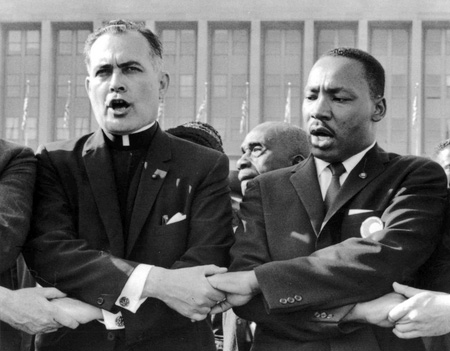You have /5 articles left.
Sign up for a free account or log in.
Rev. Theodore M. Hesburgh, president of the University of Notre Dame from 1952 to 1987, died at 11:30 p.m. Thursday night, the university announced.
Father Hesburgh was a legendary figure not only at Notre Dame, which grew and transformed in significant ways under his leadership, but for American higher education. He was a national figure on issues such as civil rights, serving on numerous federal commissions and speaking out on a range of issues. He is so identified with public leadership that when academics bemoan the lack of presidents who use the bully pulpit, a frequent refrain is that these days, there are no Father Hesburghs.
During his career, Father Hesburgh received some of the most prestigious awards in American civic life. And in a sign of his stature in American higher education, he received 150 honorary degrees, believed to be more than the number awarded to any other individual.
Notre Dame released this summary of how the university changed during his presidency:
- The operating budget grew from $9.7 million to $176.6 million.
- The endowment grew from $9 million to $350 million.
- Research funding went up from $735,000 to $15 million.
- Enrollment nearly doubled, from 4,979 to 9,600.
- The number of faculty increased from 389 to 950.
Two policy changes at Notre Dame under Father Hesburgh are considered particularly influential. The university admitted women for the first time in 1972. And in 1967, there was a shift in governance from the Congregation of Holy Cross to a mixed board of lay and religious trustees and fellows.
Father Hesburgh's reach in higher education extended well beyond Notre Dame. He served in numerous roles related to Roman Catholic higher education. He was the first priest elected to Harvard University's Board of Overseers and was president of that board in 1994 and 1995. And Father Hesburgh co-founded and co-chaired from 1990 to 2003 the Knight Commission on Intercollegiate Athletics, which has been an advocate for reform of college athletics. (His co-chairman on the Knight panel was another titan from that era, the University of North Carolina's William C. Friday.)
Sixteen times during his career, presidents of the United States appointed Father Hesburgh to serve on various commissions -- and his service involved significant, controversial issues such as the individuals who avoided the Vietnam War draft, campus protests, immigration and civil rights.
He is arguably best known in public policy for his advocacy of civil rights. Father Hesburgh was a charter member of the U.S. Commission on Civil Rights in 1957, and he led the commission from 1969 to 1972. President Nixon ousted him from that role because Father Hesburgh had criticized the administration's civil rights record.
 During his work on the Civil Rights Commission, Father Hesburgh traveled to many low-income black neighborhoods and spoke to people there in ways that were largely unheard of for prominent white people in the country. The photograph at right shows Father Hesburgh, with Rev. Martin Luther King Jr., at a civil rights rally in 1964 at which Father Hesburgh endorsed the Civil RIghts Act. An account of the rally from Notre Dame notes that Father Hesburgh appeared there after others -- such as Mayor Richard Daley -- declined to do so.
During his work on the Civil Rights Commission, Father Hesburgh traveled to many low-income black neighborhoods and spoke to people there in ways that were largely unheard of for prominent white people in the country. The photograph at right shows Father Hesburgh, with Rev. Martin Luther King Jr., at a civil rights rally in 1964 at which Father Hesburgh endorsed the Civil RIghts Act. An account of the rally from Notre Dame notes that Father Hesburgh appeared there after others -- such as Mayor Richard Daley -- declined to do so.
The home page of Notre Dame's website today features a black background, a single photograph of Father Hesburgh and one quote from him: “I never wanted to be anything but a priest, which is in itself a great and unearned grace. I hope to live and die a priest, nothing more, but nothing less either.”
The website also features a detailed account of his life, along with other resources.
Father Hesburgh published an autobiography, God, Country, Notre Dame (University of Notre Dame Press). He also is the subject of a scholarly biography, Hesburgh (Catholic University of America Press), by Michael O'Brien, professor of history at the University of Wisconsin-Fox Valley.
In 2009, Notre Dame came under considerable criticism from some Catholics for inviting President Obama to be commencement speaker even though the president's policies affirming abortion rights differ from Catholic teachings. Father Hesburgh attended the commencement speech.
In his address, President Obama referenced Father Hesburgh several times. The president noted that he received a warm welcome despite the controversy (most critics of his appearance were not current students and faculty members).
And Obama spoke of the values of Notre Dame and Hesburgh: "Open hearts. Open minds. Fair-minded words. It’s a way of life that has always been the Notre Dame tradition. Father Hesburgh has long spoken of this institution as both a lighthouse and a crossroads. A lighthouse that stands apart, shining with the wisdom of the Catholic tradition, while the crossroads is where 'differences of culture and religion and conviction can co-exist with friendship, civility, hospitality, and especially love.' "




